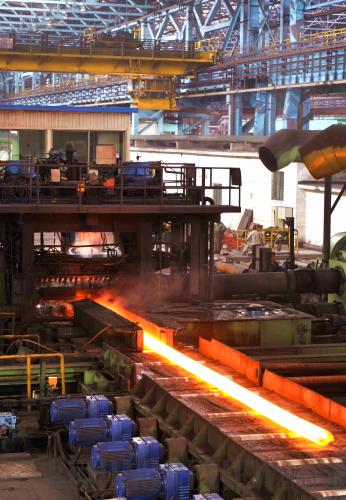|
 |
|
FOR THE ENVIRONMENT: Steel is processed at a facility in Baotou Iron and Steel (Group) Co. Ltd. High-polluting and resource-intensive steel mills with outdated technologies or overcapacity are the major targets of industrial structure reform in China (LI XIN) | Long-term benefits
The policy this time mainly targets steel products that either have a great impact on the environment or overcapacity to be eliminated, and is basically in line with the guidelines for the industry's reform, said Mei. It is conducive to reducing homogenized competition on the low-end steel market, and urges steel mills to increase research investments to develop new products. "It will benefit China's steel plants in the long term, except for small mills which have to cease operation," Mei said.
Predictions hold that 44 listed steel companies will suffer losses in the third quarter this year, but they will ride out the difficulties, because the rebate removal will turn over a new leaf for China's steel industry, said Zhang Shibao, an industrial observer with China Merchants Securities Co. Ltd.
Canceling rebates will encourage steel mills to take the initiative to cut unnecessary production, give up outdated products and technologies, and optimize their product portfolios to take advantage of this round of adjustment to sharpen their competitive edge, Zhang said.
The steel market will find a new balance during the industrial reform process.
Steel companies in Shandong and Hebei provinces will suffer most, because the two provinces export mostly steel products inclusive in the 48 items that received rebates.
But they welcomed the policy with confidence. The adjustment will bring steel mills opportunities to develop high-value added steel products for shipbuilding, auto and machinery manufacturing, as well as marine engineering, said Shandong Steel Group Ltd. It will also test these companies' survival skills in a new industrial climate.
Export Tax Rebate Changes in Recent Years
July 2007: Tax rebates were removed on exports of 687 commodities, including animals and plants on the brink of extinction, and products made of these materials, fertilizer and leather, while rebates to 1,031 commodities were reduced.
July 2008: Tax rebates were raised for textile and garment exports from 11 percent to 13 percent.
October 2008: Rebates to textile and garment exporters were further raised to 14 percent, while value-added tax rebates for some plastic products were increased to 9 percent and those for some furnishing exports up to 11 percent and 13 percent. This round of rebate adjustments involved 3,486 commodities.
November 2008: Tax rebates for some rubber and forestry products were raised from 5 percent to 9 percent, and those for some machinery and electronic products were increased from 9, 11 and 13 percent, respectively, to 11, 13 and 14 percent.
December 2008: Tax rebates for some machinery and electronic products were further increased from 13-14 percent to 17 percent, while those for motorcycles, sewing machines and electrical conductors were raised from 11-13 percent to 14 percent. The adjustment covered 553 products.
February 2009: Export tax rebates were raised from 14 percent to 15 percent.
June 1, 2009: Tax rebates for canned food and fruit juice, corn flour and alcohol, suitcases, shoes, toys, furniture, ceramic and glass products, and some plastics were raised. Rebates for cold-rolled steel, alloy steel and other steel products were up from 5 percent to 9 percent and those for metal products such as scissors were raised from 5 or 11 percent to 9 or 13 percent. The move involved 2,600 exports.
July 15, 2010: Tax rebates to exporters of 406 products were removed, including 48 steel products.
| 